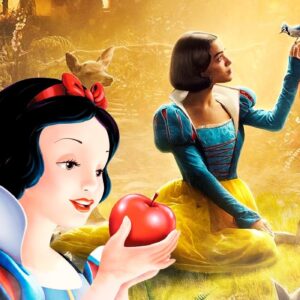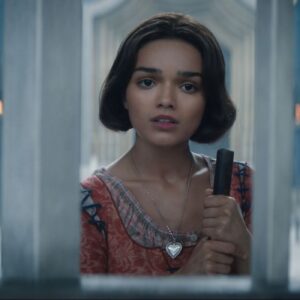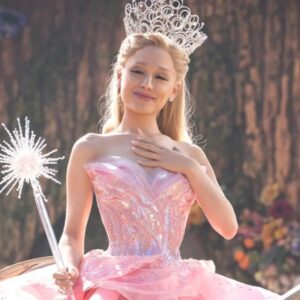
The actress in the hit superhero satire mulled her role in an age of online bullying and token feminism: “Thank God there are characters like this.”
Erin Moriarty just stopped a stranger in his tracks. But it wasn’t because he recognized her as a star on one of TV’s most popular shows, or because he was taken by her charm.
We were tucked into a quiet corner table on an outdoor patio in West Hollywood, where an attentive server had been mid-stride when he overheard Moriarty, a star of the hit Amazon show “The Boys,” describe her belief that feminism had become an “obligatory thing for studios to exhibit.” He tentatively performed the briefest of check-ins and scurried away.
“I love how he hears the word ‘feminism’ and his approach starts to slow,” she said with a laugh. She took a sip of black iced coffee and resumed her thoughts.
“I think it’s dangerous,” she said. “I feel like we’re putting a Band-Aid on systemic diseases that we’re not inoculating against.”
As the highest-billed actress on “The Boys,” Moriarty, 29, has had to think a lot about performative feminism lately, and whether the show that made her famous is really part of the solution. On one level, the series, which returned for Season 4 on Thursday, is satire, centered on the exploits of a team of morally depraved superheroes known as the Seven.
The show targets the steroidal conventions of the genre, along with the corporate pandering and exhibitionist feminism that often accompany it. Much of that critique is focused through Moriarty’s character, Annie January, better known as Starlight.
But the series is also, unabashedly, a gleefully hyper-violent comic-book adaptation; not all its fans seem in on the joke. (As Moriarty put it: They “digest the sugar without digesting the medicine.”) From them and others she has faced harassment and bullying, online and on-air, which drove her temporarily to quit social media and to fear her career was over.
Ultimately, it was the work — and her faith in the series — that got her through.
“I’ve learned to trust my showrunner,” which required a lot of “deconditioning,” she said, after years of witnessing empty gestures. “I’m used to people saying they want to do one thing with a female character and doing another thing.”

Heading into Season 4, Starlight has denounced her role in a group of superheroes known as the Seven, spurring a feminist movement against one of its members.Credit…Jan Thijs/Prime Video
“The Boys,” by her account, has been a glaring exception. Since the show premiered in 2018, it has become one of Amazon’s most popular series — according to Nielsen, it was the most streamed Amazon original in 2022, the year Season 3 debuted, beating out “The Lord of the Rings: The Rings of Power.” (Amazon declined to share viewership numbers.)
Starlight, meanwhile, is the show’s moral center, standing in direct opposition to the sociopathic Homelander, played by Antony Starr. (Picture Superman, if Superman were a narcissist who murdered innocent people in broad daylight.)
Season 4 may lighten Starlight’s narrative burden, introducing several new diabolically complicated female characters, including the superheroes Sister Sage (Susan Heyward) and Firecracker (Valorie Curry), and an amorous octopus voiced by Tilda Swinton. But Starlight’s journey still powers the story: She has denounced her role in the Seven, spurring a feminist movement against Homelander but also prompting an identity crisis, as her status as “America’s Sweetheart” is publicly dismantled. It’s a feeling Moriarty knows well.
“I just think, thank God there are characters like this, and thank God she came along,” Moriarty said. “I don’t know how I would metabolize my own experiences otherwise.”
Growing up in New York City, Moriarty first dreamed of being a musical theater star and played the title role in a local production of “Annie.” Her father was a hospice nurse by day and blues musician by night; her mother worked on the business side of an interior design company. They divorced when Moriarty was 2, and she grew up splitting her time between her mother’s apartment on the Upper East Side and her father’s place in Alphabet City.
When she was 15, Moriarty landed a multi-episode arc on the soap “One Life to Live.” At 17, she moved to Los Angeles by herself and had a supporting role in the short-lived ABC drama “Red Widow,” where a then-struggling Pedro Pascal played her uncle.
Pascal, who is almost 20 years older than Moriarty, said he had arrived to set the first day dreading the idea of making small talk with a teenager between takes. To his surprise, he and Moriarty bonded while discussing “The Hunger Games,” and Pascal said he “immediately adopted her as my little sister,” recognizing quickly “how self-possessed and independent and sharp and funny she was.”
Her career continued with a string of TV and film roles, in which she often played the love interest (“The Kings of Summer,” “Captain Fantastic”) or someone’s daughter (“The Watch,” “True Detective”).
Image

Moriarty as a teenager (with Jakob Salvati) in the short-lived ABC drama “Red Widow”; Pedro Pascal played her uncle.Credit…Sergei Bachlakov/ABC
Then came “The Boys.”
When Moriarty auditioned for the role of Starlight in 2017, Eric Kripke, the series’s showrunner, said his instant reaction was, “That’s her.”
“The character, as written, was very ‘Iowa girl next door,’ and what Erin immediately brought to the table was this intelligence,” Kripke said. “She was so obviously blindingly smart, and it was such an amazing take on the character to say, Yes, she’s from the Midwest, and, yes, she’s hopeful. But she’s not naïve.”
Developed by Kripke from the comics by Garth Ennis and Darick Robertson, the show begins as Annie wins her dream role in the Seven. But she soon realizes that they, and the corporation propping them up, are corrupt after another member called the Deep (Chace Crawford) sexually abuses her. It turns out the character has a history of misconduct against women, but he has been protected as a role model all along.
As the production filmed Starlight’s reaction shots for that harrowing assault scene, Kripke watched Moriarty convey her character’s shock and horror. She communicated the mental arithmetic of how to extract herself from the situation and, ultimately, the realization that no escape was possible.
“That’s really subtle, difficult work because she’s telling a whole other narrative behind the scene,” Kripke said. “I was like, ‘Oh, dear God, she’s really good.’”
Throughout our conversation, Moriarty used careful language, erring on the side of social commentary instead of revealing anything too personal. Her manicured nails were sharpened into metallic talons. Even her jewelry — a collection of chunky gold and silver earrings, and a chain link necklace with a large heart, like a padlock — seemed designed to protect the wearer.
Her caution is understandable. Despite the critical stance taken by “The Boys” on themes like toxic masculinity and hero worship, Moriarty has found herself a frequent target of online harassment. From internet fan spaces to an episode of Megyn Kelly’s radio show, the topic is almost always the same — her appearance.
She left Instagram in January to try to escape the growing vitriol, but she expected the worst.
“For a few months, I thought my career was over,” Moriarty said. “Because there was so much attention brought to something that I was told never to address.”
At first, her fears seemed to be coming true. The paparazzi began stalking her, and the online commentary about her looks went into overdrive.
“I was really worried about her for a period of time,” said Karen Fukuhara, who plays Kimiko on “The Boys.” “Nobody is bulletproof, even though I think she’s close to it.”

“Now, I’m not heartbroken,” said Moriarty who was bullied online and in the media on the subject of her looks. “I’m galvanized.”Credit…Amy Harrity for The New York Times
Behind the scenes, though, Moriarty had “amazing” support from Amazon and her co-workers, she said. (“Most male actors don’t have to put up with this [expletive],” Kripke said, adding: “If you can’t be kind, don’t watch the show.”) In Toronto, where “The Boys” is mostly filmed, she and other female cast members gather routinely for what Fukuhara called “estrogen nights”: meet-ups in which they discuss their industry experiences, relationships and “what it feels like to be on set as a woman.”
And online, something unexpected happened: Women began messaging Moriarty to share their own stories of harassment and abuse, and Moriarty said those voices encouraged her to re-engage and return to social media.
“I had left it on a note where I’d explicitly said that I had been heartbroken by the comments,” she reflected. “Now, I’m not heartbroken. I’m galvanized.”
She has plenty worth readying for. Moriarty is slated to star in “True Haunting,” a horror film about the family involved in the first televised exorcism. “The Boys,” meanwhile, has already been renewed for a fifth season, which will be its final.
She also turns 30 this month, and although she said she has long felt “psychologically creaky,” she is eager to embark on a new chapter that builds on what she has learned over the past year. The Hollywood career Moriarty admires is that of Frances McDormand, a fiercely private actress who immerses herself in her roles and essentially disappears outside of her obligatory appearances.
“I had to find my own relationship with work that lacked codependency, that involved finding a genuine motive to stay in the industry,” she said. “It’s been confronting, but it’s been liberating.”


